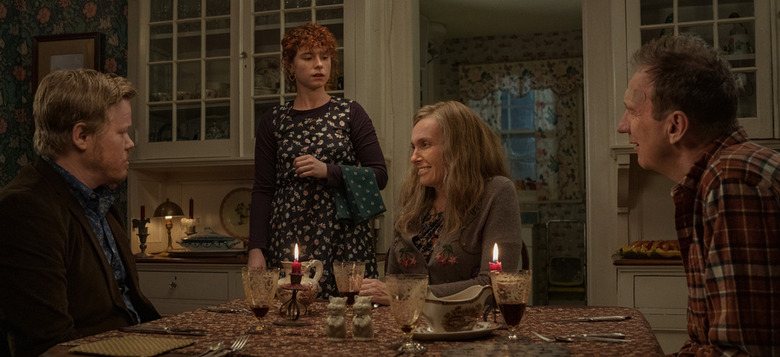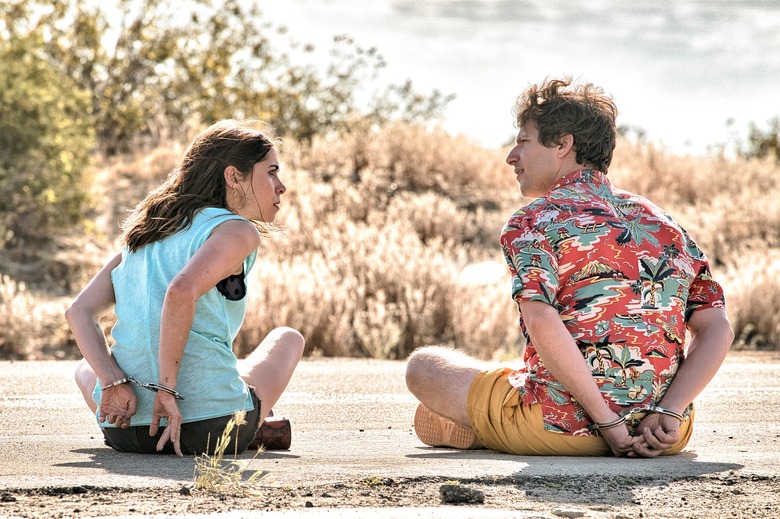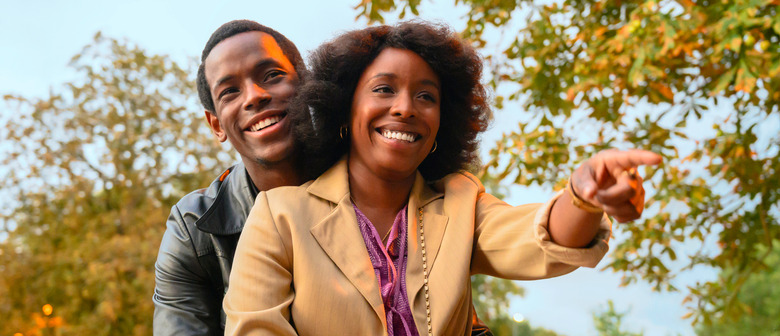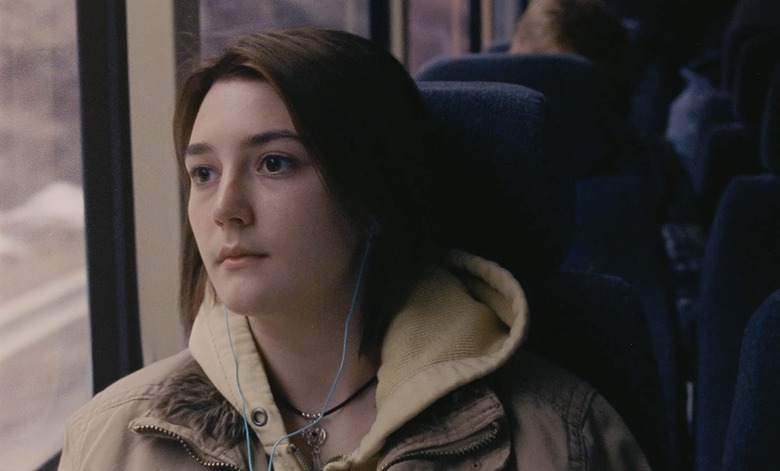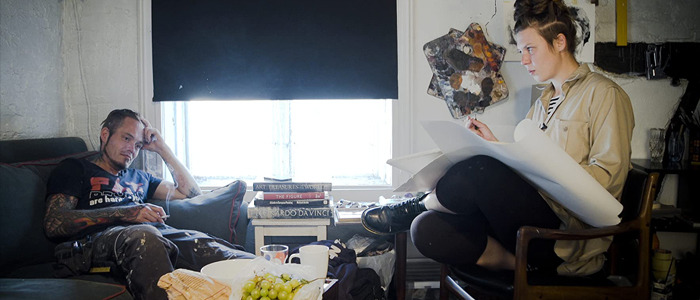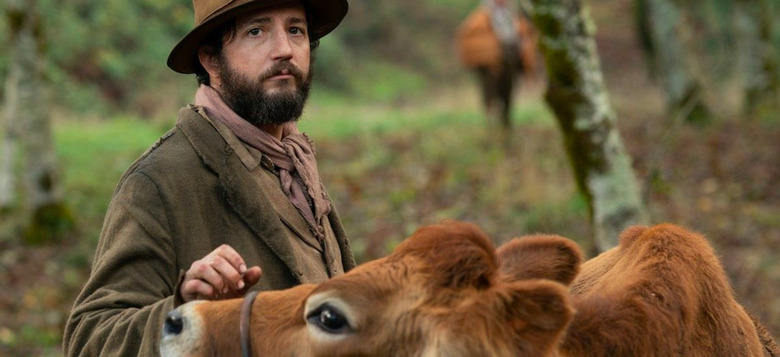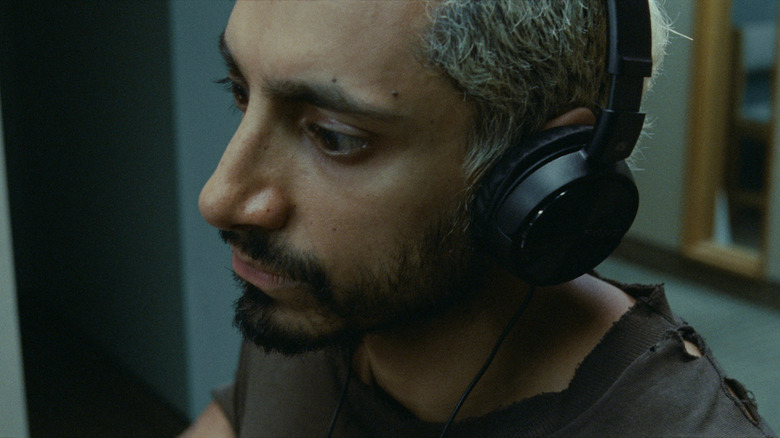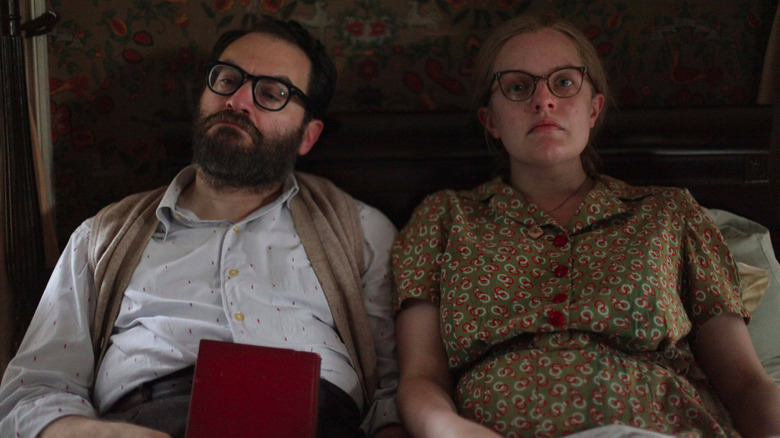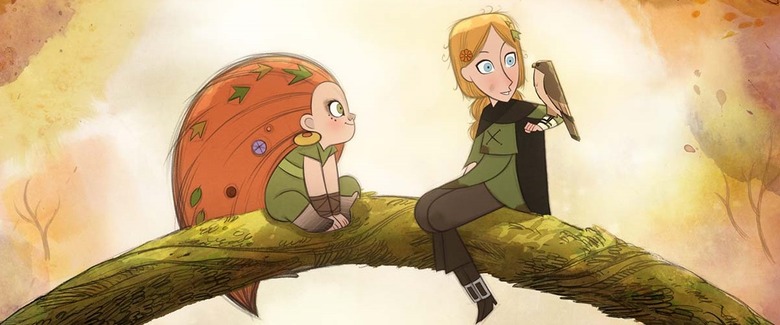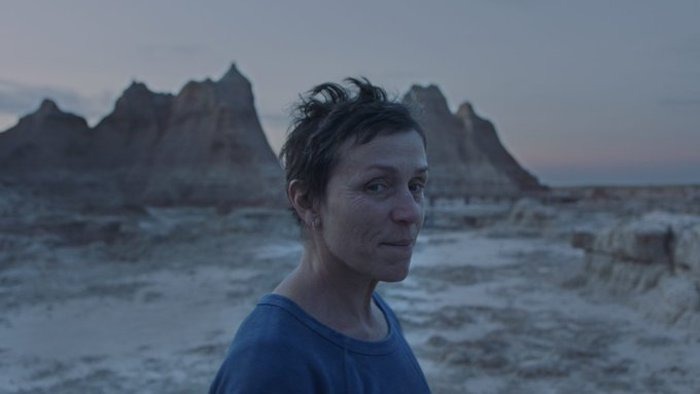Hoai-Tran Bui's Top 10 Films Of 2020
There's the temptation every year to say, "This was a bad year for movies," which is rarely ever the case. But 2020 certainly flirted with that idea, with the pandemic pushing many studio films to next year and making all other films nearly impossible to watch without a press badge at a film festival. More than anything, it was a weird year for movies, a year where entertainment became a safe haven from the horrors of reality and where we all flocked to films that either comforted us, or numbed us, or dared us to find the awful parallels in our entertainment and the real world.
For me, my top movies of the year were a mixture of all of the above. I was equally comforted and challenged by these movies, or at the very least, I couldn't stop thinking about them. Maybe that's the kind of film that will define 2020, the one that captures that weird mixed bag of emotions that kept us going through the purgatory of quarantine.
Anyway, here are my top 10 movies of 2020.
10. I'm Thinking of Ending Things
In the days, weeks after I watched I'm Thinking of Ending Things, I struggled with whether I actually enjoyed this film. But Charlie Kaufman's mesmerizing examination of solipsism crept under my skin and buried itself in my brain. In I'm Thinking of Ending Things, a tremendous Jesse Buckley plays a young woman who travels with her boyfriend Jake (Jesse Plemons) to visit his parents' secluded farm. Throughout the trip, the intrusive thoughts "I'm thinking of ending things," repeats in her mind. What is she thinking of ending? Her relationship? Her life? The questions only mount as they arrive at Jake's parent's house, where reality seems to be slipping, including her own identity. Jake constantly refers to the woman by a different name and describes events and interests that never happened, all the while his parents (a wonderfully unhinged Toni Collette and David Thewlis) cycle through a rotation of situations increasingly absurd and sinister. It becomes increasingly clear that this is all some kind of fabrication, the characters all players in a sad man's delusions. Is it self-indulgent? Sure. Is it slow and infuriating? Yes. But who are we if not projections of another person's memory? Are we not all performing in some sick play for the benefit of others? It reminded me, strangely, of a line from another favorite movie of mine, Before Sunset, in which a character jokes, "But we're not real anyway, right? We're just characters in that old lady's dream."
9. Palm Springs
The time-loop movie that somehow came to embody the quarantine purgatory that we were all in when it was released, Palm Springs is a funny and fresh romantic-comedy from Max Barbakow that feels like lightning in a bottle. Following two strangers who meet at a Palm Springs wedding only to get stuck in a time loop reliving the same day together, Palm Springs breathes new life into the Groundhog Day scenario while sneakily making the case to be one of the most optimistically nihilistic movies of the year. If the daily drudge is all we have, that won't matter as long as you have someone who can have your back — and maybe a vengeful J.K. Simmons, to make things more interesting. The sunny cynicism of Palm Springs wouldn't work if it weren't for the sparkling chemistry between leads Andy Samberg and Cristin Miliot, who sell the idea of eternal companionship as being a fact of life — though whether you take that with a glass half empty or glass half full is up to you.
8. Lovers Rock
A swooning tone poem that is the closest thing to a "vibe" that cinema can get, Lovers Rock answers the question of what it would be like if Steve McQueen directed In the Mood for Love. Light on runtime and even lighter on plot, McQueen's joyous Small Axe film takes place largely over one night at a house party that was part of the "Blues Party" culture, born out of necessity when Black Londoners were not welcome at white nightclubs. Mingling over goat curry, beers, and the sensual rhythms of reggae songs, the partygoers flirt, fight, and fall in love. There is a core cast of characters that Lovers Rock sometimes follows — including jealous birthday girl Cynthia (Ellis George), the naive Martha (newcomer Amarah-Jae St. Aubyn), and brooding stranger Franklyn (Micheal Ward) with whom Martha feels the first sparks of attraction — but mostly McQueen's camera flits about the house like a partygoer itself, losing itself to the rhythm of the music that acts as the constant soundtrack to the film. But in the standout scene from the film (and one of the best movie scenes of 2020), the music stops for a rapturous house-wide singalong of Janet Kay's 1979 single "Silly Games" — a euphoric representation of the kind of shared experiences that bring together a community and make them feel like little beacons in a dark night.
7. Never Rarely Sometimes Always
Bleak but never hopeless, gutting but never shattering, Never Rarely Sometimes Always is one of those singular films that feels completely devoid of pretense. Eliza Hittman writes and directs this powerful drama about 17-year-old Autumn (an astounding Sidney Flanagan) who discovers that she's pregnant and, with her supportive cousin, travels to New York City from their blue-collar Bible belt town to get an abortion. Their journey is fraught with dangers both everyday and existential — predatory men, unhelpful strangers, the pitying eyes of people who have seen the same story over and over again. Never Rarely Sometimes Always could easily descend into manipulative heartstring-tugging, but every moment feels achingly authentic and harsh — a truly unsparing depiction of the awfulness of being a teenage girl in America.
6. The Painter and the Thief
A knotty character study, The Painter and the Thief follows the unlikely friendship between Czech artist Barbora Kysilkova and Karl Bertil-Nordland, the man who stole two of her paintings. At the trial following Karl's arrest, Barbora approaches Karl to be her next muse, and Karl is startled and flattered at being the center of anyone's attention. The pair's relationship develops in fascinating and tangled ways, Karl revealing himself to be an infinitely interesting figure struggling with addiction and childhood trauma, while Barbora harbors her own demons. Directed by Benjamin Ree, The Painter and the Thief switches back and forth between Barbora and Karl's perspectives, to unveil a deep connection between the pair that is not always healthy, but is wonderfully human and complex.
5. First Cow
First Cow may best be described as tender pioneer buddy comedy, but that feels like it wouldn't do justice to Kelly Reichardt's sweet, offbeat character drama about two frontiersman who steal milk from a cow to start a baking business. John Magaro is a mild-mannered cook, appropriately named Cookie, who strikes up a friendship with Orion Lee's shrewd Chinese immigrant King Lu. The pair of them start to steal milk from the cow brought in by the settlement's one wealthy resident (Toby Jones) and begin to bake "oily cakes" — a backwoods riff on scones that become an instant sensation. In an unlikely deconstruction of the Western drama, First Cow is an almost laughably low stakes drama that overthrows the hyper-masculine expectations set for these kind of rugged pioneer films, and instead focuses on the lovely, near-romantic relationship between Cookie and King as they dream of making enough money to strike out west and settle down together. The pair's sweet interactions forming the beating heart to the Richardt's tender frontier fable.
4. Sound of Metal
If someone shaped their entire livelihood, wellbeing, and personality around one thing, what happens when they are suddenly cut off from that thing? Darius Marder's knockout drama Sound of Metal attempts to answer that, in a film anchored by a ferocious performance by Riz Ahmed as Ruben, a heavy metal drummer who experiences sudden hearing loss. Ahmed gives a wild, uncaged performance of a recovering addict who had only been hanging by a string — his entire life, his loves, and his mental well-being was tethered around his music career. When that tether is cut, he's at a complete loss. Loss is what Sound of Metal is good at, showing what a life in freefall looks (and sounds) like. The incredible sound design of Sound of Metal mimics the deafness that Ruben experiences, the oppressive silence threatening to smother you. But as Ruben gets used to the silence, Sound of Metal starts to linger — even relish — in the stillness between the big blow-ups and screaming matches, and find a little piece in the quiet.
3. Shirley
If a writer put a little bit of their soul in everything they put out in the world, if they have nothing left to give, then what else can they do but cannibalize the lives of the people around them? The ultimate "writer's movie," Shirley is a dizzying psychological thriller that delves into how monstrous the task of writing can be. Very loosely based on Shirley Jackson's life, Shirley turns the famous horror author into a character in one of her Gothic novels — though not as the naive protagonist, but as the madwoman. But this time, the madwoman has been let out of the attic to impart her wild ways onto the rest of the world. Elisabeth Moss has never been better as a woman on the verge, and Michael Stuhlbarg plays uncomfortably slimy a little too well, while Odessa Young and Logan Lerman hold their own as the young couple who find themselves in the grips of the older couple. Part Who's Afraid of Virginia Woolf, part Daphne du Maurier's Rebecca (right down to the Sapphic subtext), Shirley is an exploration of the feminine grotesque, the concept of ugly, complicated womanhood as as a monstrous, but strangely liberating thing.
2. Wolfwalkers
A 17th century epic that brings to an end Cartoon Saloon's informal trilogy of films about Irish folklore, Wolfwalkers is the culmination of the studio's envelope-pushing work: a heartfelt tale of love and loss wrapped up in the lushly animated storybook from your dreams. The film follows a young English girl in an Irish town, Robyn (a spunky Honor Kneafsey), whose father Bill Goodfellowe (Sean Bean, doing his best Ned Stark) has been hired by the town's Lord Protector (Simon McBurney) to wipe the last of the wolf pack living in the nearby woods. But to Robyn's surprise, she learns that the wolves are led by the last Wolfwalkers, a mother and daughter duo who have ancient shape-changing abilities that allow them to run among the wolves. Enough can't be said about the film's stunning animation — from the film's gorgeous Celtic art-inspired design to its breathtaking action sequences that verge on synesthesia, Wolfwalkers is poetry in motion. Cartoon Saloon's environmental themes and meticulous devotion to their craft set up the studio as the next successor to Studio Ghibli, but also as the last bastion of hand-drawn animation — a theme that plays well with the film's melancholy undercurrent of change. People are forgetting the Wolfwalkers, and they themselves are the last gasps of a dying culture. But even as the forest that the wolves live in disappears, and people forget their ancient myths, Wolfwalkers suggests there's still a little bit of magic left in the world.
1. Nomadland
Early on in Chloé Zhao's stirring Western drama Nomadland, there's a scene where Frances McDormand's Fern attempts to glue together a plate, one of her few precious pieces that she lugged around the country with her in her beat-up RV, after it gets broken by an enthusiastic fellow traveler attempting to help her clean up. She gets frustrated in the process, the plate is smaller, a little more jagged and mean-looking than before. But it made me think about the Japanese art of kintsugi: the mending of broken pottery with gold to call attention to the imperfections and create something stronger and more beautiful. That's what Nomadland is: an exquisite slice of Americana that uncovers beauty amid pain, and loss, and grief, and the relentless trudge through life. McDormand stars as a woman whose factory job closed up with the recession and whose husband died shortly after. Having nothing tying her down to her sad Midwestern industry town, she packs up and heads west, finding jobs where she can and meeting fellow nomads (mostly played by non-actors apart from a lovely appearance by David Strathairn) down the road. Nomadland achieves a kind of serenity in its restless spirit, an acceptance of a different way of life that no one better embodies that than McDormand, who gives a quietly spiky and soulful performance for the ages.

